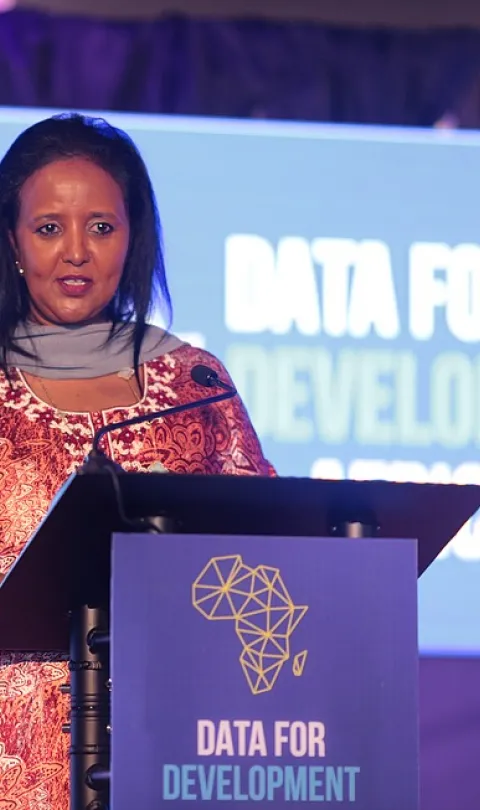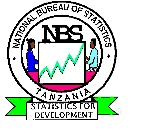MILLIONS TO BENEFIT FROM COMMITMENTS THAT INCLUDE: DATA-LED AGRICULTURE PLANS TO BUILD FOOD RESILIENCE AND SECURITY, A BIRTH REGISTRATION DRIVE USING SMS AND WEB TO WIDEN ACCESS TO HEALTHCARE AND EDUCATION AND AFRICAN DATA SCIENCE HUBS THAT WILL ANCHOR THE REGION’S FUTURE
Nairobi, Kenya – 29 June 2017
Bold commitments to use data and technology to improve lives and livelihoods were made today, at a high-level convening of African leaders, in Nairobi, Kenya. The Global Partnership for Sustainable Development Data, the Governments of Kenya and Sierra Leone, and Safaricom hosted ‘Data for Development in Africa’ 29-30 June, in collaboration with the African Development Bank, the UN Economic Commission for Africa, and the Governments of Ghana, Senegal, and Tanzania. African countries made commitments in the fields of: business, agriculture, civil registration, health, migration, and data capacity.
H.E. William Samoei Ruto, Deputy President of the Republic of Kenya opened the High-Level Meeting, stating: “I am honored to gather with African governments and businesses, charities and researchers, taking the lead in harnessing the power of technology and innovation to advance our development agenda. We are a forward-looking region, which requires timely, accessible and accurate data for the informational aspects of our decision-making. With ‘Data for Development in Africa’ we are signaling our intent to lead other developing economies to secure better futures and leave no one behind.”
H.E. Victor Bockarie Foh, Vice President of the Republic of Sierra Leone said: “The Government of Sierra Leone strongly supports this high-level forum and is scaling up its commitment to support global paths to sustainable development by 2030. Despite being a post-conflict nation that has weathered health and economic crises, we have intensified efforts to develop and implement data-led development plans. We collaborate in solidarity with other countries in Africa to discuss new strategies to unleash the power of data for the Sustainable Development Goals.”
AFRICA’S DATA REVOLUTION COMES OF AGE
Both the ambition and the scale of the plans announced by African nations are notable. Key announcements include:
- Kenya will champion the development of an Intergovernmental Network on Open Data for Agriculture and Nutrition, that will nurture an inclusive multi-stakeholder ecosystem to boost capacity of small scale farmers to use data to improve productivity, increase youth engagement in agri-business and strengthen capacities of statistical departments in Ministries of Agriculture by increasing financial allocations and human capacity. The National Aeronautics and Space Administration (NASA) will collaborate with the Ministry of Agriculture, Livestock and Fisheries and Kenya’s budding data lab at Strathmore University to provide real-time information on crop types, agricultural insurance, and weather.
- Kenya, through the Ministry of Health, will champion the use of data, technology and innovation to accelerate progress towards Universal Health Coverage (UHC) in support of the broader attainment of the SDGs. The Government will engage private sector partners to improve registration of births in hard-to-reach communities. Currently over one third of births in Eastern and Southern Africa remain unregistered, severely limiting life chances. Targeted approaches include the strengthening of the SDGs Partnership Platform convened by the United Nations in Kenya. Philips and Unilever will include other private sector players such as Safaricom to enhance connectivity to improve information flow and data collection with new technology. Royal Philips will build a Community Life Center that leverages on the data revolution to improve access to primary health care, monitor CVRS related indicators and a site for capacity building and training opportunities for nurses and traditional birth attendants. The Government of Kenya commits to work with other African Countries to build a similar SDG 3 Platform.
- Ghana will also address the plight of unregistered children with a national ID card roll-out. The ID card will facilitate access to healthcare, education, and employment, among others. Current estimates are that about 40% of births and 70% of deaths go unregistered. A birth certificate will be required to receive the national ID card, so Ghana expects to enroll millions of additional children and adults in coming months. Significant life events will be captured via the system and this new trove of data will be used to provide better public services to Ghanaians and will also be a rich source of data for statistical purposes. Ghana is also exploring use of anonymized telco data for mapping and planning for internal economic migration and access to social services.
- Sierra Leone has rolled out an open and big data initiative for fiscal and economic data, part funded by the World Bank. The government is working on a country-specific Sustainable Development Goal (SDG) data roadmap to achieve and monitor progress against the global goals, working with the Global Partnership for Sustainable Development Data.
- Senegal’s Emerging Plan (PSE) has positioned agriculture as a key driver to its ambitious inclusive and sustainable economic growth. Mapping farms, collecting, and using comprehensive agriculture statistics and incorporating satellite data from NASA are some of the measures announced. The Government of Senegal, through its central statistical office, Agence Nationale de la Statistique et de la Démographie (ANSD), working closely with Initiative Prospective Agricole et Rurale (IPAR) who are supported by Hewlett Foundation, will work with farmers and producers’ associations to fill data gaps about Senegal’s farmers, share data with them, and develop a comprehensive understanding of this key industry.
- Tanzania is using a data-led advanced data planning tool (ADAPT), developed by PARIS21, to link global and regional indicators with national development indicators, to cost and plan data production activities, and to facilitate stakeholder engagement in data production and sharing. This is part of a broader multi stakeholder effort to improve availability, quality, and accessibility of data in the country, which includes, piloting an e-population register (EPRS), development of a national development plan and SDG monitoring portal, investments to improve geographic data and labor statistics, as well as a collaboration on climate change open data.
AFRICAN DATA SCIENCE HUBS WILL ANCHOR THE REGION’S FUTURE
Several African Data Science Hubs were announced to shore up progress, increase technical capacity and coordination across the continent and to enable insights from data science to be used by countries to provide information to government for achieving and monitoring the SDGs. Connections with private sector and other partners will boost capacity across the network. Partners include:
- UNECA which will perform the role of managing regional links, scaling up partner countries and supporting National Statistical Offices in their quality assurance role.
- Kenya’s Strathmore University announced the Africa Media Hub, housing a data center in collaboration with Oracle to provide cloud services and data analytics capability for the Kenyan Data Ecosystem. The hub further integrates a Data Lab that will provide space for ideations and co-creation of data-driven solutions that address real problems in the public sector. The Hub will partner with line ministries, County Governments and the Kenya National Bureau of Statistics.
- Rwanda showcased the African Centre of Excellence in Data Science housed by the University of Rwanda and the Big Data and Analytics Centre housed by the regional training centre of the National Institute of Statistics of Rwanda for universities, research community, and media.
- UK Office for National Statistics and DFID will provide funding and support to strengthen strategic leadership and data science capacity in National Statistical Offices in the region. UK Office for National Statistics and DFID will work with UNECA in supporting Kenya, Ghana, Rwanda and other countries.
In closing remarks, the Global Partnership for Sustainable Development Data’s Executive Director Claire Melamed praised the hard work undertaken to secure political commitments: “The data revolution has come of age,” she said, “At a time when governments worldwide are under increasing pressure caused by migration, climate change, and increasing inequality, African countries are leading by example, mainstreaming innovations in a way that will benefit millions of people across the continent.”
Data for Development in Africa was also hailed a success by private sector partners. Safaricom CEO Bob Collymore said: ‘I am proud to represent a growing movement of African enterprises who see social as well as economic value in data.’
Donors that made ‘‘Data for Development in Africa’ possible included: Children’s Investment Fund, Ford Foundation, Hewlett Foundation, Safaricom, Strathmore University, UK Government, and US Government. A full list of all announcements is available here: http://www.data4sdgs.org/master-blog/2017/africa-data-revolution
Press enquiries: Jennifer Oldfield [email protected] +1 347 327 6568
###
About the Global Partnership for Sustainable Development Data
The Global Partnership for Sustainable Development Data (the Global Partnership) is a growing network of more than 250 organizations that act as data champions working around the world, harnessing the data revolution for sustainable development. Among these champions are governments, charities, businesses, and UN agencies. Since it was created in 2015, the Global Partnership has elevated data issues at a political level, launched a multi-million-dollar Collaborative Data Innovations for Sustainable Development funding initiative, and supported the advancement of country-led Data Roadmaps for Sustainable Development in Colombia, Kenya, Philippines, Senegal, Sierra Leone, Tanzania, and elsewhere. Learn more at: www.data4sdgs.org.
The Global Partnership for Sustainable Development Data is hosted by the United Nations Foundation.
About the United Nations Foundation
The United Nations Foundation builds public-private partnerships to address the world’s most pressing problems, and broadens support for the United Nations through advocacy and public outreach. Through innovative campaigns and initiatives, the Foundation connects people, ideas, and resources to help the UN solve global problems. The Foundation was created in 1998 as a U.S. public charity by entrepreneur and philanthropist Ted Turner and now is supported by philanthropic, corporate, government, and individual donors. Learn more at: www.unfoundation.org



